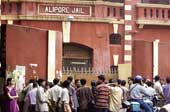 |
| Test of patience: Families of inmates often have to wait for a long time to see their loved ones |
On a crisp morning in Mumbai, as the rest of the city whizzes by, families of prisoners outside Thane Central Jail on the outskirts of Mumbai are waiting for a short glimpse of their loved ones behind bars. Huddled in groups, these people have travelled long distances, braving the pre-dawn chill and bustle, to reach the prison gates. The group could not be more diverse, in terms of caste, creed and walk of life. From a retired naval officer to construction labourers ? they all wear the same look of worry, which they desperately try to dissipate on a cement platform or the tea stall across the road. “Life will never be the same again,” says Prakash Trivedi, the middle aged retired navyman. Trivedi is here to see his son, a 28-year-old former call centre employee.
The families of prisoners also serve their own sentence of sorts. Take the case of Mary, 38, whose husband is serving a life sentence at Goa’s Aguada Jail. For a long time after she was released from three years in prison in 2003 ? after being charged with having been her husband’s accomplice in a murder case ? Mary remained the topic of her neighbours’ gossip in her sleepy village in south Goa.
Notes Father Sebastian, national co-ordinator of Prison Ministry, India, a non governmental organisation (NGO) that works with prisoners: “The community is unsupportive, children get mocked at and have to often drop out of school for lack of finances.” Women end up avoiding religious and social gatherings and daughters do not find husbands.
To be sure, there are exceptions to this rule. Sharmeela, who has come to visit her son in prison, says she’s married one of her daughters in the last year, when her son was behind bars. Besides, she claims not to have seen any difference in her relationship with her friends and relatives.
Still, life in prison can cause anguish to prisoner’s families in more ways than one. Mary lost her school-going daughter (sired by a former lover), friends, reputation, money and respect. Her younger daughter lives with her, but the older one is cared for by her mother in Mumbai. But her family stood by her. Once acquitted, her family took her under its wing. Her sister, who works in the Gulf, continues to send her Rs 1,000 a month, to supplement her income of Rs 2,000, which she earns working as a caretaker for her husband’s ‘trusted’ friend, who stepped in when her husband’s family deserted her. Her only way out of penury, she says, is to look for a job in the Gulf.
For many of these people, even weekly visits to the prison are arduous and unaffordable. Mary manages to visit her husband for a 20-minute chat once a month, after journeying two to three hours. Ramesh, who visits the prison to see his son, has limited his visits to once every fortnight. “I cannot afford to shell out Rs 16 (the return train fare) for each visit,” he says.
Though they have little money, these families often go to great extents to save up for little comforts for relatives in prison. Sushmita, a Bengali girl in her early twenties, has come armed with her seven-year-old daughter and a multi-compartment steel tiffin box for her husband, with food she cooked in the wee hours of the morning. To save him from having to eat prison food, she works that extra bit to be able to give him Rs 1,000 a month to eat from the in-house canteen. But this is a comfort that most can ill afford. So when Rukmini meets her son at court hearings, she slips cooking oil into hair oil bottles to provide a flavour of home cooking (her son has been allowed to cook his own food in jail). And she throws in additional supplies ? henna and cakes of fragrant soap. “He does not like the cake of soap provided in the jail once a month,” she says.
Most families with relatives in jail refuse to admit that their kin are guilty. Rukmini rues how her son was ‘falsely’ implicated in a murder case.
Susheela claims her son’s hand only brushed the woman who falsely accused him of snatching her chain. Sushmita says her husband, a casual labourer, was arrested only for being a Bengali. Ganga, another petite woman whose son has been in the cooler for the last six months, says he’s innocent of the rape charges levelled at him.
All the while as they speak, their eyes dart towards the policeman who at any moment will call out their names in serial order. “I’ve been waiting for almost three hours,” says Susheela, followed by a heavy silence. Moments later, the policeman starts bellowing their names. In half an hour, the group marches through the gate, past the green prison landscape. Then for a few minutes, from a distance of three to four feet, across bars, it’s question and answer time. “How are you? How are the children?” and most importantly, “When will I be out of here?” are the most common questions. Tears are shed on one side or the other, followed by some relief ? until the next time.











